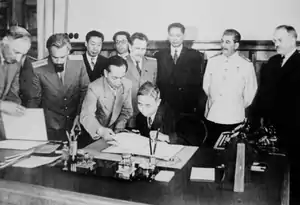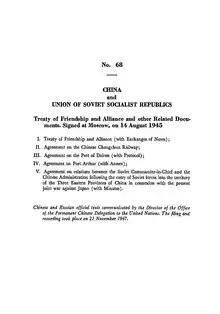Sino-Soviet Treaty of Friendship and Alliance
The Treaty of Friendship and Alliance (Traditional Chinese: 中蘇友好同盟條約) was a treaty signed by the National Government of the Republic of China and the Government of the Union of Soviet Socialist Republics on 14 August 1945. Soviet and Mongolian troops then occupied Inner Mongolia and Manchuria, after they had seized it from the Japanese during World War II. In a declaration made in connection with the treaty, China accepted the independence of Outer Mongolia within its previous borders and disavowed any Pan-Mongolist intentions of the occupiers if a referendum on the issue was held. Also, the Soviet Union ceased aiding the Chinese Communist Party and the Ili National Army, which were rebelling in Xinjiang.[1] Both nations also agreed upon joint control of the Chinese Eastern Railway and to facilitate its eventual return to full Chinese sovereignty.[2]
 | |
| Signed | 14 August 1945 |
|---|---|
| Expiry | 24 February 1953 |
| Signatories | |

However, China noticed that the Soviet Union secretly and continuously supported the Chinese Communist Party and the People's Liberation Army, which opposed the ruling Kuomintang and the government of the Republic of China. The relation collapsed after the Chinese Communist Party had proclaimed the People's Republic of China in Beijing on 1 October 1949, which was recognized by the Soviet Union. The UN General Assembly adopted Resolution 505 on 1 February 1952, which confirmed that the Soviet Union had violated the terms of the treaty by assisting the Chinese Communist Party during the Chinese Civil War.
On 24 February 1953, the Legislative Yuan of the Republic of China voted to officially terminate its commitments to the Sino-Soviet Treaty of Friendship and Alliance as well and rescinded its recognition of the independence of the Mongolian People's Republic.
See also
References
- Atwood, Christopher (2005). "Poems of Fraternity: Literary Responses to the Attempted Reunification of Inner Mongolia and the Mongolian People's Republic". In Kara, György (ed.). The Black Master: Essays on Central Eurasia in Honor of György Kara on His 70th Birthday. Otto Harrassowitz Verlag. p. 2.
- Zhang Shengfa, "Return of the Chinese Changchun Railway to China by the USSR." In Manchurian Railways and the Opening of China, 171-94. 1st ed. Vol. 1. New York, NY: Taylor & Francis Group, 2010. p, 171.